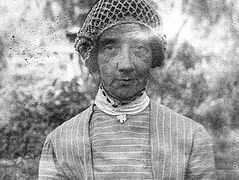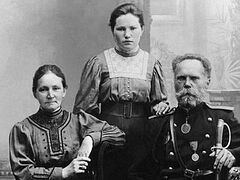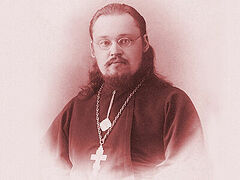There is the village of Elnat in Russia’s Kostroma region. A certain Simon Shitov lived in its area in the sixteenth century. He withdrew to a dense forest near the village and struggled there. The people in Elnat found him in a shelter of fallen trees and brought him to the village.
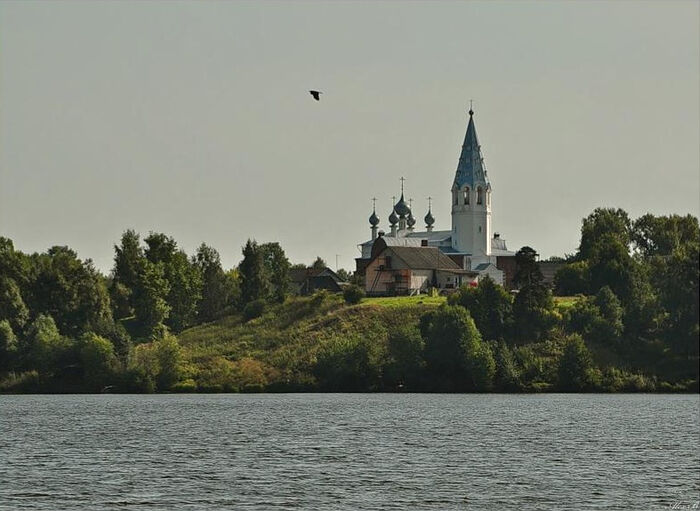 The village of Elnat. Source: Yurevets37.ru
The village of Elnat. Source: Yurevets37.ru
Simon began to help the villagers in the hardest work, but never took any money. He walked barefoot in all seasons of the year, wearing only a linen shirt. The ascetic ate little (or nothing at all—who knows?). He was skin and bones, all black from foul weather and cold. Some laughed at him, mocked him and sometimes even beat him. Simon endured beating meekly, humbly accepting abuse. The Lord endowed him with the gifts of clairvoyance and working miracles. Through Simon’s prayers fires were put out, the sick were healed and drowning people were saved. On the day of his repose he received Communion of the Holy Body and Blood of Christ. The Holy Church commemorates him four times a year, and we know him as Blessed Simon of Yuryevets, the “Fool-for-Christ”. Apparently, the saints of the Russian land have a great influence on the development of the souls of those who love the Lord and care about their own salvation.
There lived the pious Voroshin peasant family in the village of Kaurchikha of the Yuryevets district of the Kostroma province. Kaurchikha lies exactly between Blessed Simon’s Spring and the village of Elnat. Ivan Voroshin was a churchwarden, and his wife Evdokia managed the household.
In 1886, their son was born and baptized Alexei. From childhood the boy greatly venerated Blessed Simon and prayed to him fervently. No one could have imagined then that he would repeat the spiritual labor of his beloved saint.
The boy grew up in peasant life, labor and prayer, and eventually came of age; his parents decided it was time to marry him off. A suitable young lady was found. Everything seemed to be going well, and they were about to become engaged. But something unexpected happened.
The beginning of the twentieth century was marked by global changes in the very foundations of the Russian Empire. Centuries-old foundations were shaken. Many things that had previously been regarded as immoral were no longer perceived as such. For example, young people in villages would gather for so-called “conversations” [which meant dancing at a local club.—Trans.]. Those meetings were a challenge to Christian piety, but the young people were not ashamed of it. Alexei’s would-be fiancée also loved to be there. He asked her not to attend those meetings anymore. But the girl did not listen to him and continued to attend dubious gatherings. The young man thought hard about it—if she did not listen to him as a fiancée, what would happen if she became his wife? And he decided to postpone the wedding.
But apparently, not only these thoughts and experiences were in Alexei’s soul. His sensitive soul could not help but feel a storm forming over his fatherland. The storm of the First World War quite clearly conveyed to the pious young man’s mind and heart all the signs of the approaching disaster—the October Revolution with its godlessness and militant atheism. So instead of getting married Alexei went to Krivoezersky Monastery.1
In the monastery he labored as a novice for a year. Then he returned home, but began to live first in a bathhouse, and later built himself a cell in the vegetable garden. Thus he spent years in solitude and prayer in his cell or at St. Simon’s Spring. There he was caught by the Revolution.
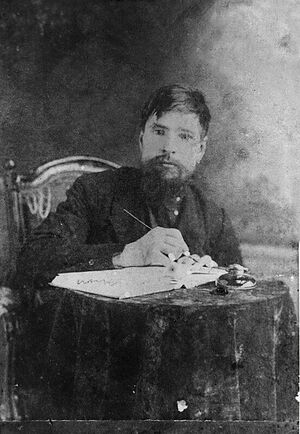 Alexei Ivanovich Voroshin The locals had Alexei Ivanovich appointed as the chairman of the Village Council—his fellow villagers respected him very much for his lifestyle and humble character. Alexei accepted everything as if from the hand of God, taking care of the village in a fatherly way and solving all issues without leaving the church. However, a new chairman of the Village Council was soon sent to the village “from above”, and Alexei continued his ascetic life without any hindrance.
Alexei Ivanovich Voroshin The locals had Alexei Ivanovich appointed as the chairman of the Village Council—his fellow villagers respected him very much for his lifestyle and humble character. Alexei accepted everything as if from the hand of God, taking care of the village in a fatherly way and solving all issues without leaving the church. However, a new chairman of the Village Council was soon sent to the village “from above”, and Alexei continued his ascetic life without any hindrance.
In 1928, Alexei left his cell, and his feat of feigned “foolishness” for Christ’s sake began. He lived anywhere he could, wore rags, and no one knew where he slept. He began to behave strangely; his fellow villagers could not always understand what he was doing. He would come to the field during the sowing season with a stick and walk up and down, measuring something with his stick. The peasants would rail at him: “It’s the busiest time and you’re getting in our way!” And they would chase him away. But he kept measuring something all the time. And some time later the authorities forcibly began to set up collective farms. Now the whole processes of sowing and harvesting resembled very much Alexei Ivanovich’s walking with his stick…
Another day Blessed Alexei shocked his fellow villagers by coming out naked and going to the houses of local shoemakers “to pay a visit”. No one understood anything at that moment. Understanding came later, when all the shoemakers’ property was seized and confiscated, and with their families, with small children, literally in their underwear they were kicked out of their homes.
Once Blessed Alexei came to another family half-naked. The owner’s wife began to curse him, but her husband stopped her and told her to bring the best clothes they had in the house. Alexei Ivanovich got dressed, went out, then undressed, put all the clothes on the porch and left. The owner should have figured out what it meant, but instead he and his wife were completely perplexed. At the end of winter they were kicked out of the house in their underwear, without being allowed to get dressed or take anything with them.
Blessed Alexei would also come up to a particular house and start measuring it out on all sides. Finally he would announce loudly the numbers he had just measured, which was perceived by others as utter nonsense. Nothing was clear. “Alexei is like a circus act!” the villagers laughed. But some time passed—and the owner of that house was arrested and imprisoned for exactly as many years as meters Blessed Alexei had measured…
One day the ascetic came to his sister Anna. He went around the house, looking for different things. Once he found what he needed, he would put it on the table, and when it was fully covered with things, he left. Anna realized that it was all for some purpose. She hid all the things collected by the blessed man. Later the authorities came to confiscate her possessions: everything was carried away except for the belongings that Alexei Ivanovich had selected and Anna had hidden.
Blessed Alexei kept repeating to a little girl: “Give me a quarter! Give me a quarter!” These words were incomprehensible to everyone. The girl grew up and got married. Her husband turned out to be an alcoholic, and very often she heard from her husband the same words: “Give me a quarter, give me a quarter!” [a quarter-liter bottle of vodka, a quarter of vodka.—Trans.].
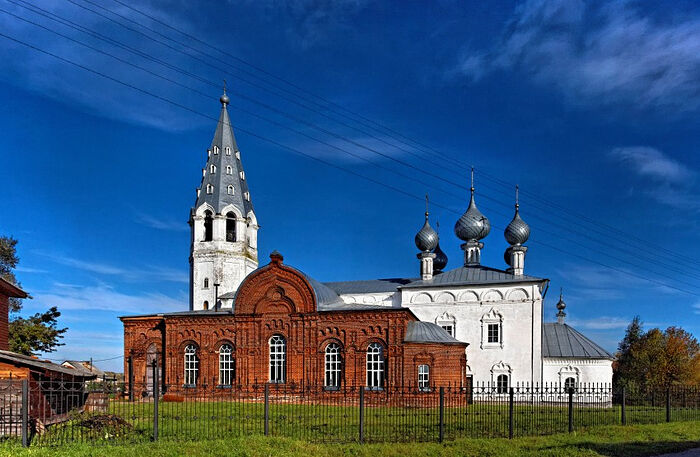 The village of Elnat. Church of the Resurrection of Christ
The village of Elnat. Church of the Resurrection of Christ
One day Alexei Ivanovich came to a church service in an absolutely unthinkable way: dressed in a hat and with a cigarette in his mouth (he did not smoke). With his hands behind his back, he strolled around the church in a presumptuous manner. He did not react to the parishioners’ perplexity in any way. He walked around the church and left.
After some time the authorities decided to close the church and ordered it to be converted into a club. Workers with hats on and with cigarettes in their mouths walked cynically around the church…
One fine day Blessed Alexei was walking along a field where peasants were cutting flax. Stopping and pointing to the sky, Alexei Ivanovich turned to the peasants:
“Oh, pray to God! Oh, how it will thunder! How it will thunder! Pray to God!”
The men didn’t understand anything this time either: the sky was clear, the weather was serene—where could a thunderstorm come from? Very soon the Finnish War began and everyone who had been cutting flax that day was taken to the front…
The man of God also made prophecies of a national scale concerning the whole country. Alexei Ivanovich predicted that there would come a time when almost all churches in Russia would be closed, but the Lord would send a harsh punishment, a war, and people would awaken, and some of the churches would be open again. But that would not last—in the 1960s a new wave of persecutions would follow: churches would be closed again and all true believers would then have a lot of sorrows.
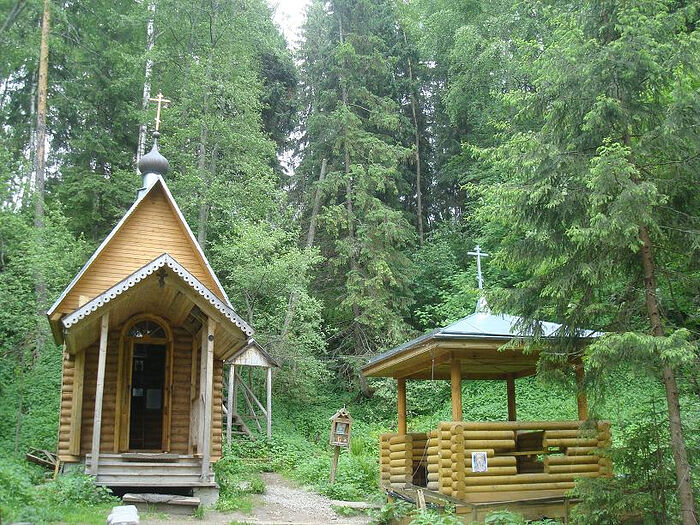 The village of Elnat. Blessed Simon’s Spring. Geocashing.su
The village of Elnat. Blessed Simon’s Spring. Geocashing.su
The ascetic played a very important role in the life of his nephew Nikolai. They had very close relations. Nikolai was the chairman of the Village Council. The authorities ordered him to close the church in the village, but he refused, in every possible way delaying the date of its closure. When it became absolutely unbearable, Nikolai withdrew from the situation. This did not save the pious young man: he was arrested and languished in prison.
During the Great Patriotic War [World War II], Nikolai was called up to the front. Before that, Blessed Alexei, who was already dead, had appeared to him in a vision and said, “Don’t be afraid! I will always be with you.” Many times Nikolai was in mortal danger, but Blessed Alexei interceded for his nephew, and the Lord kept Nikolai alive.
After the war the man decided to divorce his wife. And again the saint appeared to him. He took him by the hand, led him to the door, opened it and pointed at his wife: “Look, I’ve brought you a wife!” All bad thoughts disappeared from Nikolai’s mind after that.
The Lord revealed to Blessed Alexei the date and circumstances of his death. He told it to his loved ones, but in his peculiar, eccentric manner. No one could understand what it was all about. They didn’t understand it until after the saint’s repose.
He said to his sister Anna:
“Prepare bast shoes for me.”
“Take them yourself,” his sister was bewildered.
Fifteen years after that conversation it was Anna who bought the bast shoes in which Alexei Ivanovich was buried.
He once told his nephew Nikolai:
“Will you come to my funeral?”
“Are you going to die?”
Alexei Ivanovich was only fifty at the time: he was physically strong and healthy.
“Nothing of the sort!” the saint replied.
A year later it was Nikolai who carried the coffin with Blessed Alexei’s body.
In May 1937, the holy man came to his sister’s house with a bag on his shoulders. This was actually their parents’ house—even Alexei’s cell was preserved in the vegetable garden. Anna and her husband lived here. He entered the house, sat down by the stove and sang:
“On Sunday the old mother came to the prison gates
And brought a parcel to her dear son…”
Anna grew cold with terror: her blessed brother always sang this song before someone’s arrest.
After dinner Alexei asked his sister’s husband: “Will you come to my funeral?”
“Why are you talking about the funeral? I may die before you!”
“No, you will come!”
Alexei Ivanovich was arrested the next day. They put him in a cell with fierce criminals. He prayed day and night, no one saw him sleeping, and he gave out his food to the inmates. There was no evidence against him. To make him give evidence they placed him with his bare feet on a hot stove. He didn’t admit any guilt and endured torments courageously.
The superintendent himself wanted to see the amazing prisoner.
“Everyone says you’re a saint. What do you say?”
“What a saint am I? I am a sinful, miserable person.”
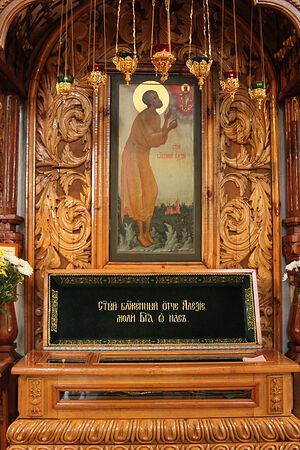 Blessed Alexei of Elnat “That’s right. We don’t keep saints here. Saints don’t commit crimes. If people end up here, there is a reason for this. Why were you jailed?”
Blessed Alexei of Elnat “That’s right. We don’t keep saints here. Saints don’t commit crimes. If people end up here, there is a reason for this. Why were you jailed?”
“Because it’s the will of God.”
They were silent for a while. And then the saint turned to the superintendent:
“Why are you talking with me when you have a tragedy at home?”
The superintendent grinned. And when he came home, he found that his wife had hanged herself. Seeing the saint’s clairvoyance, he began to think about how to release him. But it was too late—after a month of torture, Alexei Ivanovich died in the prison hospital.
His feast is celebrated on September 25—the day of the translation of his holy relics to the church of the village of Zharki in 1985.
Currently, Blessed Alexei’s relics are kept at the Convent of the Entry of the Mother of God into the Temple of the city of Ivanovo.

